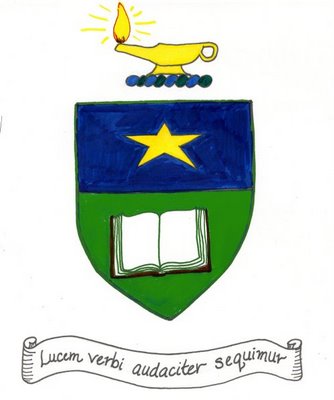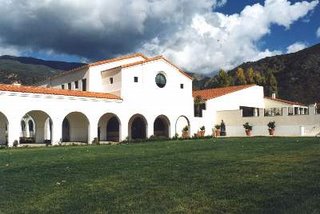I think it's a very healthy and important thing for people (especially children, but adults too) to have some unhurried time to play, learn, explore, etc. I'm always reminded of this when I take the kids to Old World Wisconsin. We only go when we have a family pass which makes it comfortable (and pleasant!) to visit for just a short time and only see a few things.
I should probably preface this (lest you get the wrong idea) with the fact that it can be quite difficult to get out the door sometimes. Some of the kids will be cranky, shoes and warm clothes (the weather has turned rather suddenly) can be difficult to locate, someone doesn't want to help their little sister buckle in, etc. etc.
They're pretty good at entertaining themselves in the car by now, though, and the gorgeous ride through the countryside becomes part of the adventure. (The stop at Target for some gatorade certainly didn't hurt).
By the time we arrived at OWW yesterday, we only had an hour before closing. This was good though because I couldn't find my watch (and that darn car stereo/clock thing has been broken for awhile) and Gus had gymnastics an hour after it closed.
Okay. We know we'll make it home in time if we leave when things shut down. I run into the ticket booth to buy a new family pass (our previous one expired at the end of May, but they're good for a calendar year - and fall is a favorite time for these outings) while Ria helps Frank with his shoes and the others wait anxiously for my return.
I get back to the car and help kiddos with wrist bands and they burst forth from the car; when Terri suddenly realizes that the weather is cool and she DOES want that sweatshirt afterall. So I send Ria (it's so nice having a teenager in the family - and she loves not having to stay and wait for each little thing) and the others off to the bathrooms while Frank and I wait for Terri (who is taking her own sweet time). Everyone is shuffled in and out of the bathrooms and we finally enter one of our very favorite places in the world.
The older four are permitted to skip ahead to the game room and wait for me there while I follow more slowly with Frank and Kate. (We love coming on fall afternoons after the school kids have gone through - we usually have the place to ourselves, though it makes for a short visit.) Frank is very cautious though. He hears a tram behind us and wants to be sure it's not going anywhere before he's willing to walk. After a few moments of toddlerly consternation, he starts cruising and Kate flies off as soon as we're in sight of the game room.
The game room is an old community center from elsewhere in the state (the details elude me at the moment), where tables are set up with old-fashioned games for the children to play with. Sometimes they have wool carding and spinning demonstrations - with hands-on opportunities - too. We've been visiting OWW since Ria was 4 (when we moved back to Wisconsin from San Diego) and this has always been a favorite spot. Ria fell in love with cloth and the idea of making things here. My blind sister-in-law has helped spin wool here. The walls are decorated with annual photo contest winners. The wallpaper is authentic... interesting... kind of gaudy.
The other nice thing about this building is that it is fenced off and has some grassy areas on either side. One is set up with hoop-and-sticks for the kids to play with. The other has a few baby animals in little stalls (this time a beautiful white calf - that enjoys lots of TLC from the kids - and two merino lambs), some woodworking demonstrations and lots of pairs of wooden stilts. As long as the little ones are "covered", the kids can move between these areas freely and everyone finds something they love.
Frank remembers to check the little egg-hatchery - which he could gaze at for hours - but, alas, these stands empty until next spring. He made his way back into the game room and I sat watching him play with one toy in the game room - completely absorbed and engaged - for 20 or 30 minutes straight. Any mom of a toddler knows how amazingly long that is and I watched in awe. The look of concentration and delight on his face was priceless. The toy was an old-fashioned (I've seen these things on Antique Road Show) cast-iron painted bank with a clown (holding a hoop), a barrel and a little black dog. If you put a penny in the dog's mouth and pressed a lever, the dog popped up and dropped the penny in the barrel. You push him back down to start over.
About 10 minutes before closing, Frank was ready to move along. He walked out the door and started heading for the village with great determination. I called everyone to follow (though Bernie was in tears since she wanted to stay at the game room). We'd have just a few minutes at the village before closing. By the time we got there (a bit of walking is involved), Bernie decided she'd be happy if we could visit the Church. (This is a little Catholic Church - St. Peter's - that dates to the early 1800s - it was the oldest Catholic Church in Milwaukee before it was moved here in the 70s). The path through the village has lots of interesting distractions and several times Frank headed over towards the sheep, who were contentedly lounging in the lee of a wooden fence - all in a row. Toddlers are funny, you know. Each time, he would carefully walk down the slightly sloping grass, in a line completely perpendicular to the road. When he came back, he'd retrace the exact same steps rather than walk along the grass at an angle toward the rest of us.
We managed a quick hello at their second-favorite spot in the whole place - the blacksmith shop (though we knew he already had put his fire out) - and headed down the road to St. Peter's. I let the big ones run ahead again (we only had five minutes left by this time - according to the blacksmith - and they're quite well-behaved in these buildings - practice makes... well, pretty good).
The church is no longer consecrated as a Catholic Church, but is still adorned with some really beautiful artifacts (including the altar piece, a few statues, gorgeous stations of the cross and the original pews) and a funky wood-burning stove in the middle of the room with a pipe running through the air to vent out a side wall. The docent, dressed in her hoopskirts and bonnet, invited the kids to gather around the little old organ. She talked to them for a few minutes, asking questions about bellows (that run the organ) and their lungs and then played a verse of Amazing Grace. I asked if they could sing one too and she happily complied (I don't think they like to assume these things). Afterwards Ria was invited to ring the bell to signal that OWW was closing (a thick rope hung down behind the door) and we started heading home.
Terri had precisely 61 cents with her (never one to waste an opportunity for shopping) and wanted to buy candy in the gift shop. I agreed - as long as she bought three sticks so each of the kids had a half piece. She reluctantly agreed (if they would each pay her back 10 cents later) and I sent her and Ria ahead to make their purchases (more tears from Bernie who wanted to tag along... sigh). Frank was manfully running along the gravel path, very deliberately staying just in front of everyone else. When Kate started to run beside him, there was an incident of pushing and shoving, leaving the rest of the kids rather unsympathetic to his wishes. They all ran past him and he stopped in his tracks, bemoaning his awful fate. He wouldn't budge until I started slowly walking after the other kids and waving goodbye.




